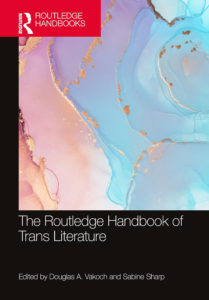
What is trans-ness in gender? One way to understand it is through the notion of performativity—how language and nonverbal communication tacitly or overtly affects social actions—is the core of all utterances and imaginative literature. Using this notion we can re-interpret literature from a more inclusive perspective.
Language and nonverbal communication affect social actions in tacit or overt ways. Examples of utterances that constitute actions (speech acts) include officiation, apologies, consents, greetings, invitations, sentencing, and complaints. Socially structured speech acts are key components of our cultural life.
Performativity, as a linguistic function, permeates all narratives (including performance) and therefore has the capacity to expand the scope of trans literature. While this chapter examines transness in performance as well as in printed texts, my focus remains on performativity as a critical concept and how it informs trans studies. The theory of trans performativity that I present here highlights the artifice of gender; I apply it to case studies that feature what might be called narratives of body-swap or malleable bodies, such as Orlando, Your Name, and The Matrix, as well as plays and films that involve metatheatrical impersonation, such as Twelfth Night and She’s the Man.
Building on J. L. Austin’s speech act theory, Judith Butler has developed, since the 1990s, a theory of gender performativity. It has been widely appropriated as a critical tool to understand sexuality and gender variance in the West, though the theory was not specifically created in the context of trans studies.
This chapter examines transness through a theory of trans performativity that re-calibrates our critical capacity to understand tacit transness.
Specifically, this chapter engages what might be called body-swap narratives in a global context that were not labeled as trans, including Virginia Woolf’s Orlando and Sally Potter’s film adaptation of it, Makoto Shinkai’s film Your Name, the Wachowski Sisters’ Matrix trilogy, as well as Shakespeare’s Twelfth Night and Trevor Nunn’s and Andy Fickman’s film versions of the comedy.
Joubin’s theory of performativity hinges on the ideas that gender are social practices and interpersonal relationships that evolve over time and in different social spaces and that these practices are constituted, and sometimes undermined, by performative speech acts. Performativity destabilizes the idea of singularity and the perceived absolutism of such signifiers as gender.
The case studies show further that trans performance can become overt or tacit over time. Actors may use certain stage practices to suppress or index transness in specific contexts. Their speech acts may be recognized or misrecognized by audiences as symbolizing or evading particular themes. In a future point in time, the actors may no longer desire that same type of legibility.
==========================
Excerpted from Alexa Alice Joubin, “Performativity and Trans Literature,” in The Routledge Handbook of Trans Literature, ed. Douglas A. Vakoch and Sabine Sharp (2024), 29-39. Full text freely available.
